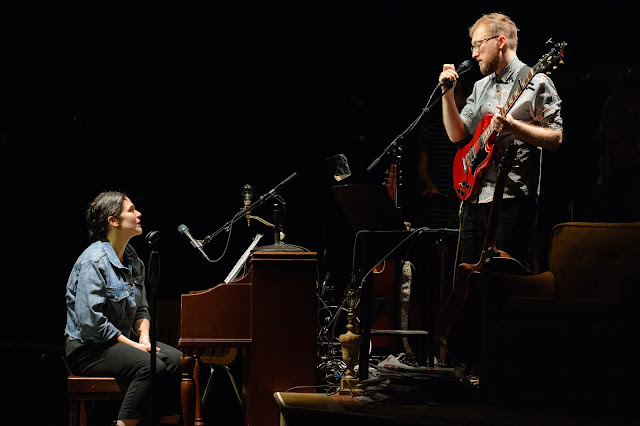“Better Luck Next Time”
It’s been only three months since Shaun and Abigail Bengson—the
married indie-musician team called The Bengsons—closed Hundred Days, their
flawed but promising first full New York production at the New York Theatre
Workshop.
Abigail and Shaun are now back, just a few blocks east, at
Alphabet City’s Connelly Theatre, with their new musical, The Lucky Ones, produced by Ars Nova. Directed by Anne Kauffman,
who also directed Hundred Days, it’s
larger scaled than the earlier show, but it’s a similarly autobiographical
(mostly) musical play/concert, given a stripped-down, café theatre-like
approach. And it’s similarly flawed but promising.
 |
| Company of The Lucky Ones. Photo: Ben Arons Photography. |
 |
| Abigail Bengson, Shaun Bengson. Photo: Ben Arons Photography. |
Occasionally, a chorus is ensconced in a loft area behind
the audience; the venue, built in 1874 as part of what originally was a church
orphanage, served for the orphans’ choir. Seeing the chorus, if you’re suitably
flexible, requires you to swivel your head.
The Lucky Ones,
being largely autobiographical (“a true story, even the parts that never
happened,” Shaun declares), allows The Bengsons to play themselves. Joining
them are 14 actor-singers (five of them forming the “ensemble”), plus the two
musicians who make up the Bengsons’ electro-folk band, Dani Markham and Pearl
Rhein.
 |
| Shaun Bengson. Photo: Ben Arons Photography. |
Their hippie-like parents, Sherrill (Myra Lucretia Taylor)
and Tom (Tom Nelis), run the progressive Summerhill-like Blue Mountain School, where
students are instructed to question everything. The sisters attend it along
with their neighboring cousin, Kai (Damon Daunno), son of their mother’s sister,
Mary (Maryann Plunkett), whose daughter is Amber (Amelia Workman).
The rambling, not particularly enthralling story describes
Abigail’s dysfunctional family (including her philandering dad); the free-range,
ultraliberal upbringing the children received; the arrival of a sweet new student
named Emma (Adina Verson); Kai’s attraction to her; the drug-fueled
hallucinations that put him under an angel’s spell (Zach McNally) and drove him
to commit a horrible act of violence; and efforts to resolve the family’s issues
in later years. The program includes a family tree illustration with cartoons
showing the relationships of all the characters.
 |
| Damon Daunno. Photo: Ben Arons Photography. |
Very little action moves the narrative forward, creating a
sense of stasis. What we witness is mainly offered in the form of memories and
comments on the memories, much of it based on verbatim transcripts of interviews
with those involved. For an example of how memories sans action can create
artistically exciting theatre no better example could be cited than Albee’s Three Tall Women, now in revival on
Broadway.
While the rather dreary tale is often lightened by the
music, as the play progresses over an unnecessarily long two hours (with one
intermission), talk begins to take precedence over music, the words becoming boring
blather. Just because the memories are expressed in articulate language doesn’t
make them as fascinating to an audience of strangers as they must be to The
Bengsons. Some of what we hear, in fact, recaps material about Abigail and
Shaun already visited in Hundred Days,
making The Lucky Ones its prequel.
Anne Kauffman deserves credit for her physical staging,
especially the breakfast scene early in the show where most of the characters
are introduced, but Sonya Tayeh’s unusual choreography is the most memorable
visual component. Kauffman, though, has failed to shape or edit the material in
a compelling way, allowing its incipient sense of self-indulgence to eventually
overshadow everything.
 |
| Abigail Benson and company. Photo: Ben Arons Photography. |
Luckily, The Lucky
Ones has a first-rate cast, veterans Nelis, Taylor, and Plunkett giving the
production a genuine touch of class supported by promise in all the younger
players. (Fun fact: Plunkett was the last actress to play Shaw’s St. Joan in
New York prior to its current incarnation with Condola Rashid.)
Abigail Bengson, who plays guitar and drums, has a
versatile, powerful voice and an expressive presence offset by the softer tones
and less intrusive personality of Shaun Bengson. Their music, which appears to
have given them a following, touches various styles, from bluegrass to rock,
some of it broadly accessible, some of it narrowly idiosyncratic, is not an
ideal fit for narrative musical theatre.
Whereas the music often emerges from the dialogue, it just
as often—when Abigail is singing—has a self-conscious, stand-alone quality that
fails to engage the narrative and draws more attention to the singer than what
she’s singing.
If you’re familiar with The Bengsons, enjoy their sound, and
don’t mind an overwritten, unkempt script, you can consider yourself one of the
lucky ones. For myself, I wish them better luck next time.
OTHER VIEWPOINTS:
Connelly Theatre
220 E. 4th St., NYC
Through April 21



